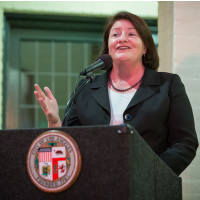State Bills Target Child Sex Trafficking in Key Cities
 Assembly Speaker Toni Atkins (photo: Getty House Foundation)
Assembly Speaker Toni Atkins (photo: Getty House Foundation)
By Nick Cahill, Courthouse News Service.
SACRAMENTO, Calif. (CN) - Seeking to combat "high-intensity" human trafficking in California, Assembly Speaker Toni Atkins introduced legislation that would create safe houses for exploited children and a statewide human-trafficking task force.
The bills would generate temporary housing and mental health services for children rescued from the underground industry and train law enforcement agencies to prevent and recognize human-trafficking operations in their counties.
In a statement, Atkins called human trafficking "modern day slavery" and said the crime is spiking in many of California's largest cities.
"According to the FBI, the San Francisco, Los Angeles and San Diego metropolitan areas comprise three of the nation's 13 areas of 'high-intensity' child sex trafficking exploitation in the country," the San Diego Democrat said.
Rescued child-sex trafficking victims face a cloudy future as many have no ties to the cities they were forced to work and are typically shuttled into foster care or juvenile detention. Criminals target women and girls from broken homes, and experts estimate that over half of victims of human trafficking were at some point in the child welfare system.
Assembly Bill 1730 provides child victims with access to mental-health specialists and peer mentors familiar with the trauma commonly experienced by sex trafficking victims.
"Integrated strategies are necessary in order to help child victims of sexual exploitation in California and to ascertain the service models and strategies that are effective in the recovery of the child and the child's future," the bill states.
A companion bill, Assembly Bill 1731, would create the "Interagency Human Trafficking Task Force" to collect data on human traffickers, people paying for sex and the victims themselves. The task force would advise lawmakers and law enforcement agencies about human trafficking trends in California and provide statewide training protocols.
Atkins said the bills were created by the California Legislative Women's Caucus, which has prioritized curbing human trafficking. More bills are planned, the speaker said.
"Victims of human trafficking are some of our most vulnerable members of society, and we cannot allow this injustice to continue," Atkins said of the inspiration for the proposals.
The FBI estimates there are more than 100,000 children in the U.S. commercial sex industry, and that human trafficking is a $32 billion per year industry globally. According to the National Human Trafficking Resource Center statistics, more than 711 cases of human trafficking were reported in California in 2015, and more than 3,800 cases have been reported since 2007.
In January, a California lawmaker proposed a bill that would bar manufacturers from selling smartphones with unbreakable encryption so that law enforcement agencies could access the information on human trafficking suspects' phones. Under the bill, investigators would still need to obtain a warrant to access the encrypted information.
The bill's author, Assemblyman Jim Cooper, D-Elk Grove, said human traffickers often use encrypted smartphones to run their operations.
"Full-disk encrypted operating systems provide criminals an invaluable tool to prey on women, children and threaten our freedoms while making the legal process of judicial court orders useless," Cooper, a former Sacramento County Sheriff's Department captain, said.
To Learn More:
24% Increase in Calls to U.S. Human Trafficking Hotline (by Ellen Wulfhorst, Thomas Reuters Foundation)
In First of its Kind Case, Victim Goes after Financial Damages for Rape and Sex Trafficking (by Noel Brinkerhoff and Danny Biederman, AllGov)
Sex-Trafficking Gangs Using “Grotesque Version of a Legitimate Business Model” Busted by Feds (by Ken Broder, AllGov California)
The Anti-Trafficking Law that Backfired into the Current Flood of Child Immigrants (by Noel Brinkerhoff, AllGov)
Judge Blocks Human Trafficking Proposition (by Ken Broder, AllGov California)
- Top Stories
- Controversies
- Where is the Money Going?
- California and the Nation
- Appointments and Resignations
- Unusual News
- Latest News
- California Forbids U.S. Immigration Agents from Pretending to be Police
- California Lawmakers Urged to Strip “Self-Dealing” Tax Board of Its Duties
- Big Oil’s Grip on California
- Santa Cruz Police See Homeland Security Betrayal in Use of Gang Roundup as Cover for Immigration Raid
- Oil Companies Face Deadline to Stop Polluting California Groundwater





